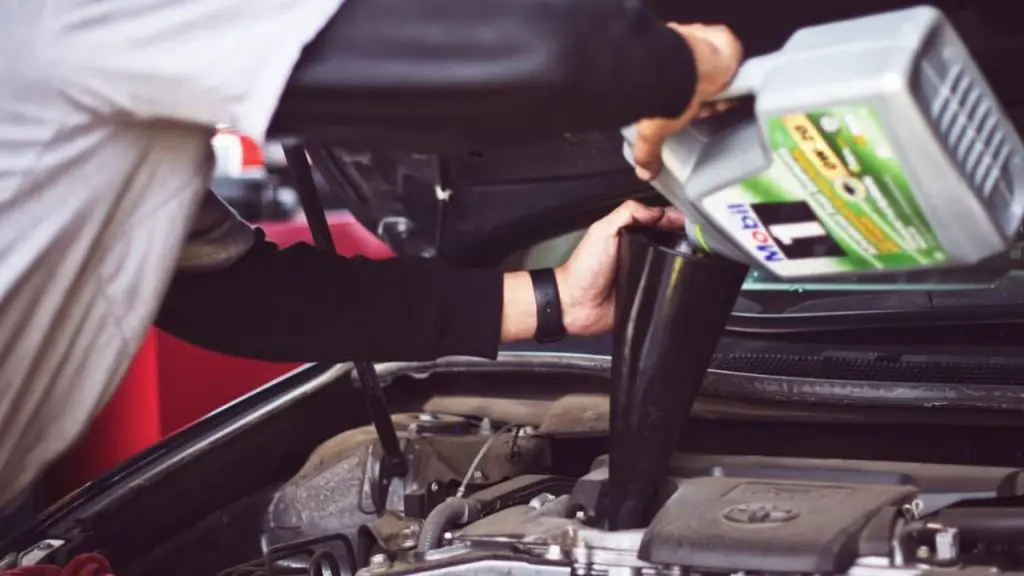If you’ve ever driven through a deep puddle or been caught in a rainstorm, you may have wondered what happens if water gets in your engine. The truth is, if water enters your engine, it can cause serious and expensive damage.

In this blog post, we’ll take a look at what can happen if water gets in your engine, and we’ll provide tips on how to prevent this from happening. Stay safe out there!
Can water in the engine damage it?
Yes, water can damage your engine if it leaks into the cylinders or oil system. Water can cause corrosion and rust, and it can also cause engine components to seize up. If water gets into the cylinders, it can cause the engine to misfire.
If water gets into the oil system, it can cause the oil to break down and degrade, which can lead to engine damage.
While most people are aware that water and engines don’t mix, there are still a lot of misconceptions about the effects of water on engines.
For example, many people believe that driving through a puddle can cause water to enter the engine and destroy it. However, this is not usually the case. Most engines are designed to be able to withstand a certain amount of water exposure. That being said, there are some situations where water can damage an engine.
For example, if an engine is already low on oil, adding water to the mix can cause the engine to seize up. In addition, if water gets into the spark plug chambers, it can prevent the spark plugs from firing correctly, leading to engine damage.
As a result, it’s important to be aware of the potential risks of driving through puddles or exposure to other sources of water.
How do I know if water got into my engine?
If your engine has been exposed to water, it’s important to check for signs of water damage. Water can cause a lot of damage to an engine, and if it isn’t caught early, it can lead to some serious problems.
Here are some signs to look for that may indicate that water has gotten into your engine
1. Discolored or dirty oil
If the oil in your engine looks discolored or dirty, it could be a sign that water has mixed in with it.
2. Foggy headlights
Another sign of water in the engine is foggy headlights. This is caused by condensation and is a sure sign that there is too much moisture in the system.
3. Strange noises
If you start to hear strange noises coming from your engine, it could be a sign that water has gotten into the bearings or other moving parts.
4. Leaking
Water can also cause leaks in the engine. If you notice any fluids leaking from your engine, it’s important to have it checked out to see if water is the cause.
If you notice any of these signs, it’s important to take your car to a mechanic and have them check for water damage. Catching it early can save you a lot of money and headaches down the road.
What happens if water gets in your engine?
If water gets into your engine, it can cause a number of problems. The water can cause the engine to seize up, and it can also damage the bearings. The water can also cause the cylinders to rust, and it can also damage the piston rings. In addition, water can also cause the spark plugs to foul.
Water can enter the engine in a number of different ways. One way is if the car is driven through a puddle of water that is deeper than the engine’s intake manifold. Another way is if the car is driven through a flooded area. Finally, water can enter the engine through the cooling system if there is a leak in the system.
Most engines are designed to run on a mixture of gasoline and air. The gasoline powers the engine, while the air helps to cool it down. When water gets into the engine, it interferes with this process. Gasoline is hydrophobic, meaning that it repels water.
As a result, water droplets can prevent the gasoline from reaching the engine’s spark plugs. This can lead to a loss of power and decreased performance. In extreme cases, water can also cause the engine to seize up completely. As a result, it is important to be careful when driving in wet weather and to avoid puddles whenever possible.
How much water does it take to ruin an engine?
It only takes a small amount of water to ruin an engine. When water enters the engine, it can mix with the oil and cause corrosion. Additionally, water can damage the gaskets and seals, leading to leaks. And if the water mixes with the coolant, it can cause overheating. As a result, even a small leak can quickly cause serious damage to an engine.
The best way to avoid this type of damage is to keep an eye on your engine’s fluids and have any leaks repaired promptly. By taking these simple precautions, you can help ensure that your engine will stay in good working order for years to come.
If you do happen to get your car’s engine wet, it’s important to act quickly. Drain the oil and replace it with fresh oil as soon as possible. You should also have the engine checked by a mechanic to make sure that there is no lasting damage. By taking quick action, you can minimize the damage and keep your car running smoothly.
How do I fix my engine water?
If your engine is overheating, one possible cause is a leak in the cooling system. If you notice any leaking under your car, it’s important to take action right away. The first step is to check the level of coolant in the radiator.
If it’s low, add coolant until it reaches the full line. Once you’ve done this, start the engine and let it run for a few minutes.
If the temperature gauge needle rises into the red zone, turn off the engine immediately and call a tow truck. If the gauge doesn’t move, there may be a leak in the radiator hose. Inspect the hose for any cracks or holes and replace it if necessary.
Finally, check the thermostat to see if it’s stuck in the open position. If so, replace it with a new one. By taking these steps, you can fix most leaks in the cooling system and prevent your engine from overheating.
If you think your engine is low on water, the first thing you should do is check the radiator. If it’s empty, you’ll need to add water. The best way to do this is to remove the radiator cap and add water until it reaches the top of the radiator.
Once you’ve done this, put the radiator cap back on and start the engine. Let it run for a few minutes, then check the level again. If it’s still low, you may have a leak. To fix a leak, you’ll need to take your car to a mechanic.
How long does it take for an engine to dry out?
It depends on the engine and how wet it is. A dry engine can start within a few seconds, while a very wet engine may take up to 30 minutes to dry out. If the engine is only slightly wet, it may take 10-15 minutes to dry out. Engine drying time also depends on the temperature and humidity levels.
Higher temperatures and lower humidity levels will speed up the drying process, while lower temperatures and higher humidity levels will slow it down. In general, however, most engines will dry out within 20-30 minutes.
When your car is exposed to water, it’s important to dry out the engine as soon as possible. The amount of time it will take for the engine to dry out will depend on several factors, including the temperature and humidity of the environment and the amount of water that was exposed to the engine.
If the engine is only slightly damp, it may only take a few hours for it to dry out completely. However, if the engine is wetter, it could take up to a day or two for it to dry out completely. In any case, it’s important to start the car and run the engine for a few minutes every few hours to help speed up the drying process.
Conclusion
Water can enter an engine in a number of ways, from rain or snow to puddles on the ground. Once water gets into the engine, it can cause all sorts of problems. Water can get into the cylinders and mix with the fuel, causing corrosion and seizing up the pistons.
Water can also get into the electrical system and short out components. -If water does manage to make its way into the engine, it’s important to have it serviced as soon as possible to prevent further damage. Ignoring a water-damaged engine will only lead to more expensive repairs down the road.
Additional Contents:
What Happens To Tattoos When You Lose Weight
Do Fingerprints Grow Back If Burnt?
Can a Turtle be Without a Shell?
PPS Or PSS?
How to Unscrew a Stripped Screw



